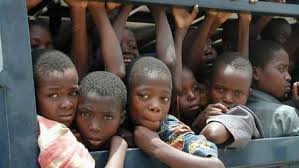According to the United Nations Convention on the rights of a child (1989), a child means anyone below the age of 18 years. The same 18-year-old benchmark was adopted in the Child Rights Act 2003.
Trafficking, on the other hand, is the recruitment, transportation, transfer, harbouring or receiving of persons, by means of threat, or use of force, or other forms of coercion, abduction, fraud, deception, abuse of power or of giving or receiving payments and benefits to achieve the consent of a person having control over another person for the purpose of exploitation.
Therefore, child trafficking is the recruitment, transportation, transfer, harbouring, or receipt in kidnapping of a child for the purpose of adoption, exploitation, forced labour or slavery.
Causes of child trafficking in Nigeria:
- Poverty: Poverty is a major factor responsible for child trafficking in Nigeria. Impoverished families have limited choices than to abandon their children. For example, where a poor family consist of nine children, the parents will have no option that to entrust some of their children to a trafficker who promises to take their children abroad to make money and live a better life.
In addition, Poverty has made Children to be left on the streets hawking or doing other menial jobs to earn little money for food. According to reports, there are estimated to be around 120 million children living on the streets in the world. This situation easily makes these children victims of child traffickers.
Furthermore, poverty is the end product of unemployment and this rate of unemployment has forced people to indulge in the illegal business of child trafficking as a source of income.
- Illiteracy: Currently, there are millions of illiterates around the world, of which children constitute the majority population. These level of illiteracy amongst children makes them to be lured into trafficking in the form of Prostitution, forced labour, forced marriage, domestic work and so on.
- Humanitarian crisis: Humanitarian crisis is an event or series of events which poses a threat to the health and safety of a community. This includes man-made disasters, complex emergencies and natural disasters. During these humanitarian crisis, children are often rendered homeless, parentless or lost and this serves as an opportunity for traffickers to take advantage to lure, exploit and transport these children.
- Ineffective Legislation: Most countries lack an effective legislation against child trafficking, offenders and measures to prevent Child trafficking. The absence of these has given green light to the increased rate of child trafficking.
Further, some countries who have Legislation against child trafficking and related offences, have failed to enforce it. Thereby giving it the same effect of a country without an effective Legislation against child trafficking.
- Broken homes: Millions of homes around the world have either been broken or the children rendered as orphans. This situation makes these set of children vulnerable to child trafficking.
- Desire to make wealth: This is another cause of child trafficking, as the desire to make money cajoles people to indulge in child trafficking given its lucrative nature. According to the estimates by the International Organization for Migration, the profits accrued from child trafficking yearly is $10 billion.
These profit could even be more by now and this explains why more people want to indulge in this business of child trafficking as they see it as a quick way to make wealth. Also, greed to make wealth often see parents sell their children to traffickers in return of money or fictitious promise that the child will come back in less than a year very wealthy.
Solutions
- Creating awareness: Government and relevant agencies around the world should create awareness and enlighten citizens on the issue of child trafficking, it’s causes, techniques used to lure children into trafficking, dangers of child trafficking and punishment for offenders.
In addition to the creation of awareness, government authorities should put measures such as restriction of movement on boarders, security on every point of entry and exit of a country, monitoring of movement in and out of a country, and other relevant measures necessary to bring abrupt the increasing rate of child trafficking.
- Enforcement of Laws: The legislative framework for child trafficking should be strictly enforced across all countries. Where these Laws are strictly enforced, offenders prosecuted and heavily sanctioned, the rate of child trafficking will reduce.
- Establishment of rehabilitation centers and orphanage: Rehabilitation centers should be established for survivors of child trafficking in order to help them rebuild their lives and also orphanage should be built to prevent child trafficking.
The establishment of orphanage across the nook and cranny of every country will help take children who are orphans, victims of broken home, poverty and humanitarian crisis off the dreaded streets, and will therefore make these children risk-free from trafficking.
- Provision of Employment Opportunities: This is an important solution to the issue of child trafficking because the dimensional change in perspective of the world has made money everything. Nowadays, you simply cannot do anything without money, but when you are unemployed how will you get this money? This situation has driven many people to indulge in child trafficking as their means of employment and source of income. To therefore put an end to child trafficking, lucrative and legitimate employment opportunities must be availed and accessible to all citizens.
- Education: it is widely said that “What you don’t know is your elder brother.” And of course, your elder brother can exercise control over you. Same is applicable to the issue of child trafficking, because these traffickers who are well tricky and knowledgeable use such knowledge to lure children who are illiterates into trafficking. That’s why illiterates constitute majority of the victims of child trafficking.
The government should therefore put measures to ensure that education and necessary knowledge is acquired by all children. Measures like free and compulsory primary and secondary education will be sufficient to drastically reduce the number of illiterates in a country and as such reduce the rate of child trafficking.
Conclusion
Without doubt, the issue of child trafficking is worrisome. It is sad to see children who have a great future being sexually abused, molested, and treated as slaves. More so, it is pathetic to see youths who ought to contribute their quota to national building, indulging in trafficking for personal gains and as such terminating the image of their country.
To this effect, I urge the government and relevant authorities to seriously consider these issue of child trafficking, look into my recommended solutions, and implement other relevant solutions in order to make this issue of child trafficking a thing of the past.
Zainab Ado Abubakar,
Department of Mass Communication, University of Maiduguri, Borno state




